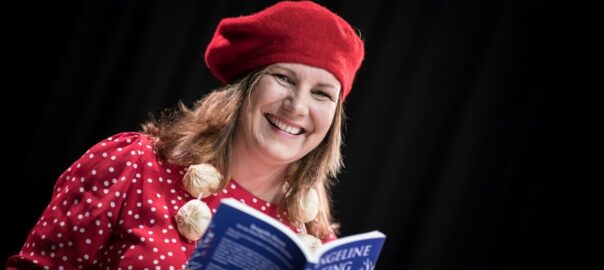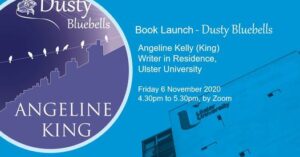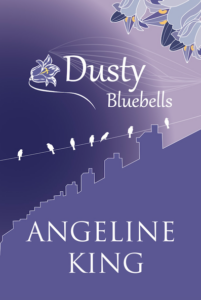I was so pleased to be introducing Angeline King at the launch at Ulster University on 6th November of her novel, ‘Dusty Bluebells’. This is an important book in the history of writing in Ulster Scots – about which we heard more from the experts.
I met Angeline early in 2018 when I was looking for writers working in Ulster Scots while I was researching for a novel I’ve since written about issues to do with language in Northern Ireland.
I was quickly impressed by Angeline’s particular type of intelligence. In our conversation she mentioned coming up against an obstacle of one kind or another in her creative life, as everyone does, but I noticed that, each time, she had analysed the situation and gone away to learn more about the elements involved and then returned, better equipped to tackle the issue. I noted that she regarded learning a foreign language in order to dissolve a barrier as something that was perfectly feasible. It just required application. She has a BA in French and History and an MA in Business and Applied Languages – French and Spanish –and she has also learned Dutch.
This capacity to engage with a barrier, instead of simply berating it or turning away from it, is very valuable in any walk of life. Perhaps particularly so in the creative life where so often the barriers are invisible ones, of prejudice, or a lack of expertise in the moment, or a resistance to doing things in a new way or even an unhelpful gate-keeping mentality.
Here, I thought to myself, of Angeline, is someone who has the ability, the dynamism and the taste for collaboration which means she will go far whatever she tackles. But, again, these qualities are enormously valuable in the writing life, one in which there is a strong temptation to individuality given the lone effort necessarily involved and also the fierce competition for publication.
But Angeline is an ‘us’ person, not a ‘me – me’ person. While chair of the influential group of female writers in N Ireland, Women Aloud NI, she reacted to the constrictions of lockdown in the spring by launching and organising, with others, the publication of ‘North Star: Short Stories and Poems by Female Northern Irish Writers’. As well as being a novelist and poet she has, through her work in the community, taken the pleasure of writing and publication to many around her.
As well as self-publishing three works of adult fiction she has written a history of aspects of Irish Dancing and the children’s book ‘Children of Latharna’ which includes text in Irish and Ulster Scots.
I am delighted that Angeline is now a PhD candidate at Ulster University and that, in addition, she has been appointed as the Ulster University Writer in Residence. This is aligned to her PhD project and will last for three years. We look forward to the resultant novel! Her research is on female novelists who write in Scots; dialects in fictional diaries and East Antrim & West Dumfries and Galloway.
She is the recipient this year of an Arts Council of Northern Ireland’s Individuals Emergency Resilience Programme grant.
And she is an engaging blogger on matters of language and of Scots and Ulster Scots.
At the launch, Dr Frank Ferguson, Director of the Centre for Irish and Scottish Studies, emphasised how Angeline’s PhD would strengthen Ulster University’s capacity to work in and with indigenous languages and their literature.
Feature Image Photo Credit, Vincent Taggart, VST images


